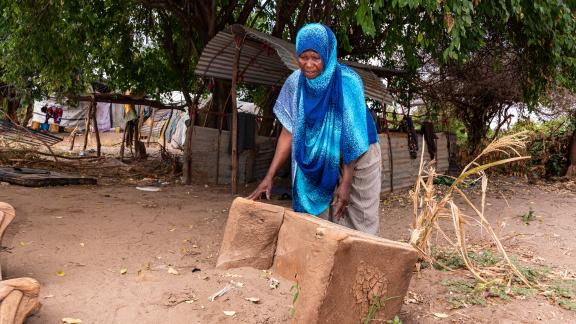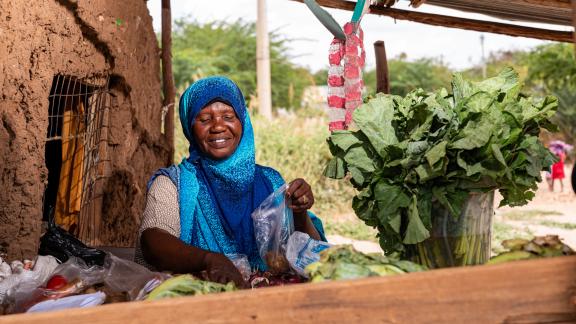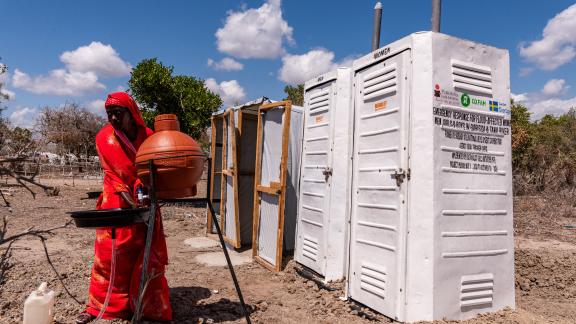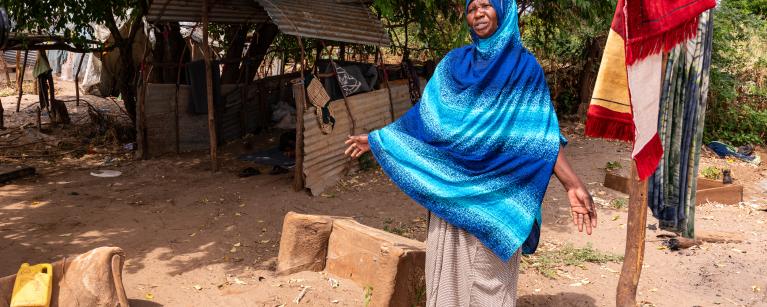Ziwani a calm village on the outskirts of Garissa was not spared either. Deep and gaping trenches, dilapidated drainage areas and collapsed perimeter walls bare testimony to the menacing floods that characterized the area.
Mariam recounts vividly the period before the rains. “We had just experienced a period of prolonged droughts before rains commenced. Periodically and without warning, the rains turned into catastrophic floods that swept the houses leaving many scampering for higher grounds for safety.
Mariam walks through the empty space that has piles of sand and pieces of iron sheet stuck in the ground. That is what remains of what was his 3-bedroom house.
“I have a family of 8, 6 children, my husband and I. where I stand, there was a 3-bedroom house. It was swept off by the floods and I did not manage to salvage household items. These Brocken sofa seats stuck in the ground were items I had purchased on credit; I had not even finished paying for them when the floods struck. For now, they are stuck on the ground and even removing them won’t do us any justice as they cannot be used again.” Says Mariam, a sense of disappointment written all over her face.
Their new abounds became makeshifts structures and tents donated by donor communities domiciled within the region.
Besides the loss of items, the floods exposed the community to health hazards. Cholera was registered due to lack of clean water and sanitation.
“I have a family of 8, 6 children, my husband and I. where I stand, there was a 3-bedroom house. It was swept off by the floods and I did not manage to salvage household items. These Brocken sofa seats stuck in the ground were items I had purchased on credit; I had not even finished paying for them when the floods struck. For now, they are stuck in the ground and even removing them won’t do us any justice as they cannot be used again.”

Mariam Salat points at the wooden seats stuck in the soil in the aftermath of the floods. Photo by Nick Ouma/Oxfam.
Oxfam and the local implementing partner; Pastoralist Girls Initiative (PGI), gave the community a new lease of live to navigate the shock of the floods by providing cash and other non-food items.
‘’When we were given the cash to rebuild lives, we bought foodstuff, clothes and school uniform for our school going children. In addition, the second batch of cash was used to start a small business to enable the family to earn a living. I used the cash to start a small business for selling mandazi. Later I opened a kiosk where I sold food items such as kales, tomatoes, onions.”
“When we were given the cash to rebuild lives, we bought foodstuff, clothes and school uniform for our school going children. In addition, the second batch of cash was used to start a small business to enable the family to earn a living. I used the cash to start a small business for selling mandazi. Later I opened a kiosk where I sold food items such as kales, tomatoes, onions.”

Mariam Salat at her grocery shop. Photo by Nick Ouma/Oxfam.
In response to the sanitation needs, through the project the community members affected were supplied with medicine to treat the cases of cholera. In addition, the community benefited from construction of mobile toilets.
Through initiative, the implementing partner PGI provided clean water for the community to reduce cases of waterborne and diseases emanating from unhygienic practices. The communities around Garissa and Tana River were supplied with mobile latrines and bathing facilities. In addition, they received water schemes; four in Tana River and one in Garissa.
The impact of the toilets, bathing facilities within the various IDP camps in Garissa and Tana River has ensured proper hygiene practices.

Mobile toilets for communities impacted by floods in Garissa and Tana River Counties. Photo by Nick Ouma/Oxfam.
To further restore the dignity of women and girls, the project also saw the provision of personal items such as lessos, washing products, sanitary pads, innerwear among other household items.
For Mariam, these items were crucial for the family as they were rearing from a disruptive episode in their lives. “We are thankful to the donor for considering us and supporting us with these items.”
Even as the community members within Ziwani rebuild their lives, they look forward to the government and well wishers to considering building for them permanent structures. “While we acknowledge what the donor has done, we request them to continue helping us with even permanent structures to avert a destructive episode if the floods recur” states Mariam.
For a successful implementation of the intervention, collaboration between partners and local governments was crucial. It involved mapping, training, stakeholder engagements, sensitization meetings among other engagements.
Through concerted efforts by various stakeholders, restoration of livelihoods is possible to mitigate effects and shocks of flood to areas that are hard-hit. Like Mariam, regaining dignity and rebuilding lives is possible through such interventions.
